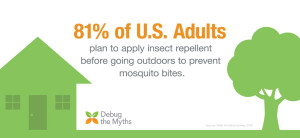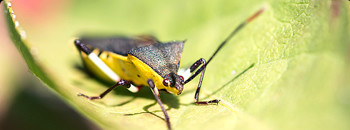Recent survey shows more than 80 percent of people are using insect repellent, but not changing travel plans
WASHINGTON, D.C., July 19, 2016 – According to a recent survey conducted by RISE (Responsible Industry for a Sound Environment)®, people are taking simple actions to protect themselves, their families and their homes from mosquitoes this summer; however, 95 percent of U.S. adults still plan to hit the road, despite concerns about the mosquito-transmitted virus.
The survey, which questioned more than 1,000 U.S. adults, found insect repellent is the most common first line of defense people are choosing to protect against mosquito bites. People also plan to keep windows and doors closed and screens in good repair – which is particularly important as Aedes mosquitoes, the species that can spread the Zika virus, prefer to live indoors. Aedes never stray far from people – their food source – to satisfy their “grazing” nature of biting all day long. Frequent mowing to reduce moisture and mosquito-hospitable environments in your yard is another common Zika-prevention step.

When it comes to controlling mosquitoes versus keeping the biting insects away, 53 percent of people plan to apply pesticides to their yards to control mosquitoes, and 47 percent would consider adding mosquito control to their lawn care routine. Karen Reardon, vice president of public affairs with RISE, says controlling mosquito populations is an important part of an integrated mosquito management approach.
“Putting up a personal barriers, reinforcing your home and property, removing standing water where mosquitoes breed, and knocking down existing mosquito populations with EPA- approved solutions, create a four-sided barrier of protection,” Reardon said.
With both repellents and pesticides to control mosquitoes, Reardon says selecting the right product and reading and following label directions is essential for safe, effective use. The Environmental Protection Agency (EPA) recommends considering multiple factors when choosing a repellent, including the amount of time you will be exposed and whether you need protection from both mosquitoes and ticks, or just mosquitoes. If a product is registered by the EPA it means the agency has reviewed and accepted data to support the products’ claims, giving assurance of its efficacy. EPA-approved mosquito repellent labels will note if the product is registered specifically for Aedes mosquito protection or mosquitoes in general.
While the Zika virus threat is mostly concentrated in the southern part of the U.S. and specific international locations, those surveyed are not changing travel plans due to the public health concern. Ninety-four percent of millennials ages 18-35 said they are not considering canceling their travel plans even though the average first-time mother at 26 years old as reported by the Centers for Disease Control and Prevention (CDC), falls within this age group.
“People are not planning on changing travel plans, so it is important for them to think about ways to prevent Zika virus transmission,” said Karen Reardon. “Everyone must do their part to protect themselves from mosquito bites and help manage mosquito populations when traveling to- and from- areas where the virus is currently or could become active.”
Because the research indicates people are looking for simple, yet effective, actions to protect themselves and their families, RISE (Responsible Industry for a Sound Environment)® offers the following tips to help prevent mosquito bites.
- Put up personal barriers. Wear light-colored clothing and cover up with long sleeves and pants and consider repellent-treated clothing treated with EPA-approved pesticides. Remember, while many mosquitoes are particularly active during dawn and dusk hours, Aedes mosquitoes that can transmit the Zika virus, bite all day long, and can bite up to 12 people during that time.
- Reinforce your home. Make sure the screens on your windows and doors are in good repair and close all windows and doors to block entry points for mosquitoes.
- Apply mosquito-specific defenses. Apply EPA-approved insect repellent on exposed skin, especially your legs. The CDC recommends a variety of safe and effective repellents for you and your family. Read the label directions on repellents before applying.
- Eliminate standing water. Aedes mosquitoes can breed in water trapped in containers as small as a bottle cap. Survey your home for possible areas of water collection – tire swings, buckets, bottles, clogged rain gutters, birdbaths, pet bowls, toys, flowerpot saucers, wading pools and more. All of these water catchers attract mosquitoes and give them a place to breed.
The Zika virus, which is transmitted through Aedes aegypti and Aedes albopictus mosquito bites, causes symptoms ranging from mild fever to a skin rash to conjunctivitis and is thought to be responsible for a range of birth defects, including microcephaly (abnormal smallness of the head linked to incomplete brain development).
The virus is currently active in 50 countries according to the CDC, and although there haven’t been any locally acquired cases reported in the contiguous U.S., cases have been reported in Puerto Rico, American Samoa and the U.S. Virgin Islands.
About RISE
Located in Washington, D.C., RISE is the national association representing the manufacturers, formulators, distributors and other industry leaders involved with pesticide and fertilizer products used in turf, ornamental, pest control, aquatic and terrestrial vegetation and other non-food/fiber applications. Learn more about RISE at www.pestfacts.org and www.debugthemyths.com.

